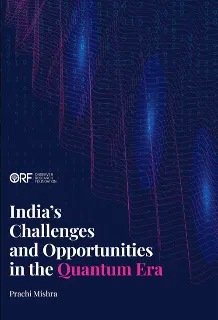Introduction
When Google announced “quantum supremacy” in 2019,[1] there was a sudden global wave of programmes and strategies to develop quantum technologies and demonstrate their applicability. What was once enigmatic and elusive had now been demonstrated in the tangible world. In the course of this century, and even later, technologies will be developed based on the fundamentals of quantum mechanics that will carry the potential to change human life as we know it.[2] For the last four decades, scientific and technological advancements have been made in the realm of quantum science. Today, we stand on the cusp of the “second quantum revolution.” States and tech firms have started investing billions of dollars into building quantum computers that will allow researchers, scientists and technologists to solve problems that classical computers would take hundreds of years to solve.
Against this backdrop, it is important to study the implications of quantum computing on emerging technological development. Quantum capabilities will disrupt modern-day cryptography, alter the way business and commerce are conducted, and dramatically change the methods of information transfer.[3] Given the potential of quantum computing in strengthening national security, states are formulating strategies to speed up quantum technological development.[4] From the West to the Indo-Pacific, nearly all major economies have rolled out their national missions and programmes to accelerate research and development in quantum computing. India formally entered the race when it announced its National Mission on Quantum Technology and Applications (NM-QTA) in the Union Budget 2020.
This report attempts to elucidate the progress of quantum technologies in India so far. It also presents a detailed Theory of Change framework—posited by Carol Weiss—to evaluate the outcomes of the country’s quantum mission. In analysing the challenges impeding India’s progress, this report utilises insights gained from consultations with experts from industry, scholars, graduates, and PhD students from quantum laboratories in different parts of India, as well as entrepreneurs working in India’s quantum startup space. The analysis relies on the PESTLE framework, formulated by Francis Aguilar in the 1960s, to study the implications of political, economic, social, technological, legal, and environmental/ethical factors on an organisation or a process or a public policy.
The report also makes recommendations for overcoming the challenges. These include the need for states and tech firms to formulate rules, guidelines and accords for the ethical use of quantum computing.
Read the entire report here.
[1] John Martinis, “Quantum Supremacy Using a Programmable Superconducting Processor,” Google AI Blog, 2022.
[2] Ronald de Wolf, “The Potential Impact of Quantum Computers on Society,” arXiv, 2017.
[3] de Wolf, “The Potential Impact of Quantum Computers on Society”
[4] Scott Buchholz et al., “The Realist’s Guide to Quantum Technology and National Security,” Deloitte Insights, 2020.
The views expressed above belong to the author(s). ORF research and analyses now available on Telegram! Click here to access our curated content — blogs, longforms and interviews.

 PDF Download
PDF Download



 PREV
PREV


